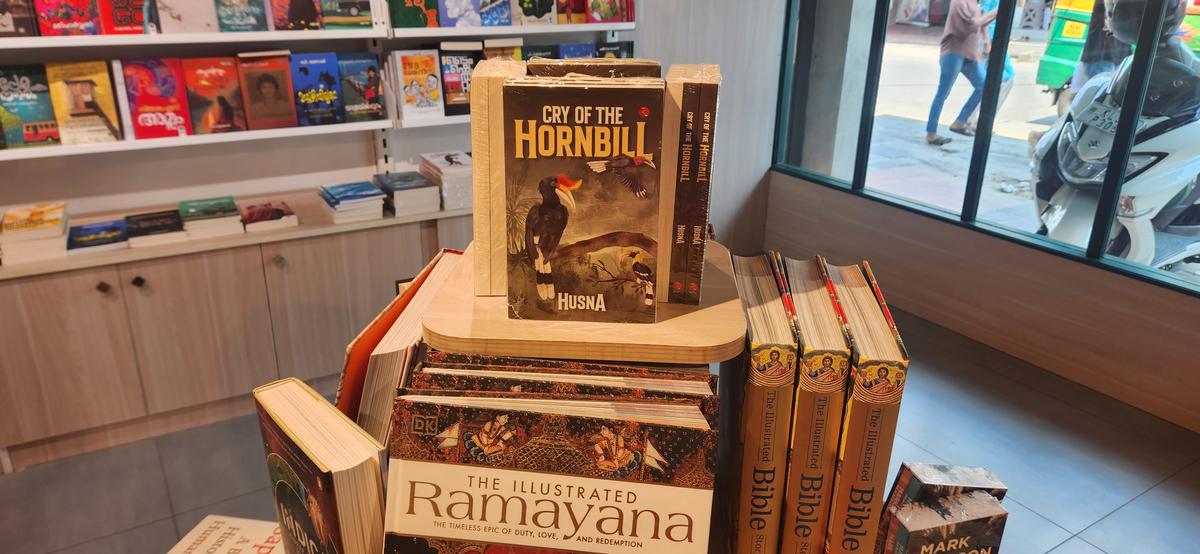
Cry of the Hornbill author Husna
| Photo Credit: SPECIAL ARRANGEMENT
After a week-long trip to Nagaland, in 2017, during the Hornbill Festival, taking in its sights and culture, interacting with the people, immersing in the natural beauty of the place, Kochi-based writer and poet Husna came away with a seed for a story she wanted to tell. A couple of years later, in 2019, the manuscript of her novel, Cry of the Hornbillwas ready. She sent it to Rupa Publications, and after a wait of six years, which includes the pandemic years, Cry of the Hornbill was finally published in February 2025.
The wait has been long, but Husna is on cloud nine. Despite the bouts of impatience, the desire to ‘get the story out’ she is glad that she waited. The soft-spoken Husna is all smiles when we meet, the happiness contagious.
Diving into how the book, and its unusual setting (for a Kerala-based writer) came to be, she says, “The inspiration was the history of the Konyaks, the head-hunter tribe of Nagaland. As we travelled around the State, the guide would tell us stories about the traditions of the people and this struck a chord.” That was not the only inspiration, a European photographer on the trip also found a space as one of the key characters in the story about a journalist’s murder; a Naga cop, Inspector John Angami, who cracked the case; the Rohingyas seeking refuge in Nagaland and the fantastical nomadic people, the Khanabadosh.

The reader traverses through Nagaland – Kohima, Mon – to Khin Tha Ma in Myanmar and Cox Bazar, Bangladesh, as the story travels to these places, not necessarily in this order. This is new territory, literally and metaphorically, even for the reader because we do not often come across fiction located in the North East, especially Nagaland. Although she had her notes to refer to, she read up articles online, watched documentaries and even bought a couple of books on Nagaland. “Online, there is very little on Naga culture, so I had to dig deep for information.”
Travelling contributes hugely to her work as a writer, not just in terms of the geography, she says. “I want to use (my) different experiences of cultures and their understanding to incorporate into the story.” And sometimes it could be something she has seen or heard on the news. In the case of Cry of the Hornbill it was the Rohingyas. “News that resonates with me will figure in my stories!”
And crime is her favourite genre as a writer. But she does not read thrillers. “I don’t want to be influenced by something that I read. It would subconsciously stay with me and I don’t want that to happen.”
It is interesting how she organically weaves the Rohingya crisis into the narrative. “I felt that, while every other war and crisis in any part of the world has been covered extensively, the Rohingyan conflict is one that has not been covered enough. Possibly because the conflict does not have a voice loud enough within Rakhine (the Rohingyans live in Myanmar’s Rakhine State) to be heard outside.”
The realisation that displacement could happen to anyone, at any time pushed her to write about it. She says, perhaps, her dream of becoming a journalist, a war correspondent, led her to thinking this way or “write about things, as a fiction writer, touching upon contemporary issues to create awareness and make a difference in some small way.”
This is not Husna’s first book. Longinga collection of short stories, was her first work of fiction and another was Red River Rising. She has also published works of poetry: My Lyrical Symphony and Remembrance. A dentist, she was drawn more to writing. Husna, who quit dentistry to become a writer, has been a freelance writer for newspapers and magazines and also a content writer.
Cry of the Hornbill published by Rupa; is priced at ₹295 and is available in bookstores and online
Published – April 04, 2025 03:13 PM is







